The median price per square foot declined between December and
January for both detached homes and condos:
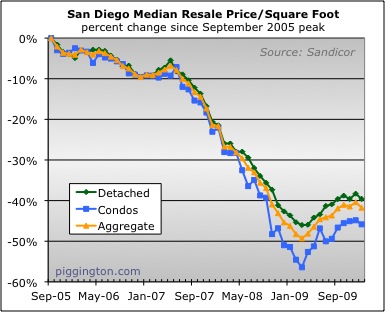
Prices by this measure have really gone nowhere since September
2009. As I noted at the Voice last week, the rally that began in early 2009 has
clearly come to an end.
Ha ha, speaking of the Voice, they allow comments on my blog entries
over there now. There have actually been some good ones, but in
response to the afore-linked article, someone posted this gem of a
comment
(reproduced here in its entirety):
Dude you are so freakin’ funny. All your
numbers are nothing but the pure B S!
Brilliant! How exactly can “numbers” from independently
verifiable data sources be “the pure B S” — or even the impure
B-space-S? They’re just numbers, my dimwitted and semi-anonymous
friend — and provable numbers at that.
That kind of insightful analysis makes me a little dewey-eyed as I
think back to the good old days of 2005.
Moving on, the vanilla median was also down for both property
types. The aggregate median was down significantly more than
either the detached or condo median for reasons I will explain below.
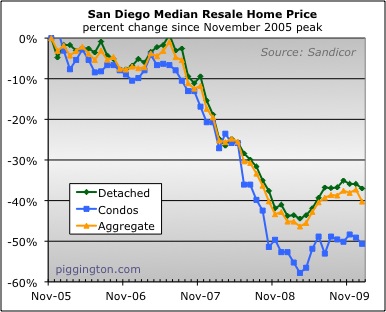
If my proxy for the Case-Shiller index is correct, January will see
the first decline for the index since it turned up last April.
However, it should be noted that the monthly decline in the proxy was
fairly small — just .4 percent — so the actual CS index could go
either way.
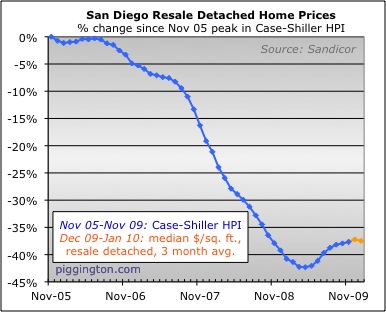
The trend in sales was interesting in that January experienced a
fairly steep drop in activity. Now, sales often decline in
January, but not to this extent. In the prior four years, the
average December to January sales decline averaged about 9%.
Between December 2009 and January 2010, sales dropped by 24%.
That’s quite a bit in excess of the typical seasonal decline. In
a Voice article, I theorized thusly:
I would guess that the dropoff in demand
relates to the perceived expiration of the homebuyer tax credit in
November. (I say “perceived” because the credit did not in fact
expire, but was renewed for another six months). Perhaps the
initial frenzy to close in November spilled into December once the
credit was extended, with the market finally taking a breather once
that final surge of activity had worked its way through the system.
I also noted that this was not a particularly elegant nor satisfying
explanation, but nothing else sprang immediately to mind.
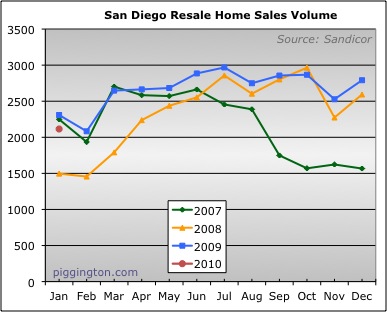
Another interesting aspect of January sales was that the slowdown
was heavily concentrated in detached homes. Detached home volume
dropped by 30% while condo sales dropped by just 10% for the
month. This abrupt shift in the composition of sales is what
resulted in the steep drop in the aggregate vanilla median, as fewer
(typically more expensive) detached homes sold in comparison to
condos. As documented
in the UT, the median price as calculated by DataQuick fell by a full
7.6%.
Inventory also dropped, though that’s also typical for January:
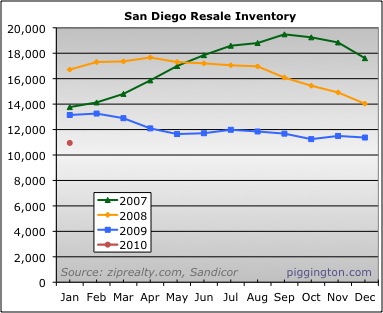
The comparatively steeper drop in sales raised the
months-of-inventory figure to about 5. You can see that the
year-over-year difference tightened quite a bit between December and
January as a result of the bigger-than-seasonally-normal sales decline.
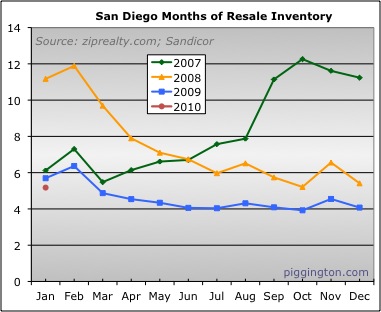
The aggregate home price rally that began last year is
over. Will it pick up where it left off in the spring? We
will have to see whether the January sales dropoff was just the lull
after the tax credit expiration frenzy — and before the next
expiration frenzy this spring — or something else. Adding to
the potential wildcards, Printmaster Ben (Bernanke) has said that the
Fed will stop monetizing mortgage-backed securities in March, a course
of action that could result in a mortgage rate increase. Yet that
may be partially offset by the GSE’s new unlimited credit line from the
Treasury, (sneakily announced on Christmas Eve in a move that can only
be described as the pure B S), which
will doubtless be used for some kind of housing bailout
chicanery.
So I’m afraid that the near future looks as murky as ever.

Dude…Stop giving me your B
Dude…Stop giving me your B S man…LOL
My prediction: The market will do nothing for a long time.
Murky? Yea…We’ll skeg along the bottom for a while as any uptick (spring) will be met with banks putting more inventory on the market and, when that’s all done, it’ll be the Fed’s turn to start raising rates and getting the greater economy back on it’s feet while no longer subsidizing the housing market…Dude….That’s my B S LOL
You know, Rich, I was always told before I came out to SD that the weather was so much the same for so much out of the year that the TV weathermen needed a gig. For example, there are cowboy weathermen, KUSI freaky- but infectious weathermen, etc… Rich, you need a persona gig Dude LOL
“Well you don’t need a million dollars to do nothing, man. Just take a look at my cousin, he’s broke, don’t do sh*t.”
— Lawrence
Office Space
Another great post, Rich.
Another great post, Rich. Thank you!
As much as I’m a bear, it’s entirely possible that the decline in sales volume in both new and existing homes is due to the lack of inventory. IMHO, there are a lot of buyers out there, but many have given up on the search because there is nothing to buy. If anything remotely tempting comes on the market, it’s swarmed by crowds of families and investors, all trying to outbid one another.
Look at the inventory levels you’ve posted. We have the lowest levels of inventory we’ve seen in years.
And as for the decline in new home sales this week…haven’t starts been down at record lows for the past couple of years? Again, the low sales numbers are probably due to the lack of inventory, not a shortage of buyers, IMHO.
The decline in sales might actually be a bullish sign — no inventory, no sales. Of course, Bernanke will use the *appearance* of a weak market to justify his printing schemes. More resources and time wasted because nobody in power is interested in actually fixing the problem (asset prices are too high, and we collectively have too much debt).